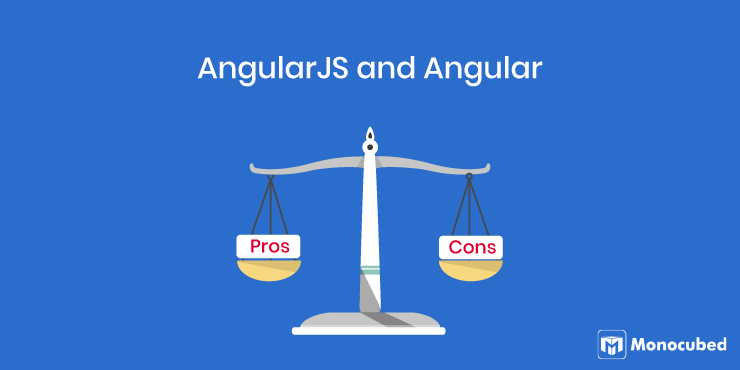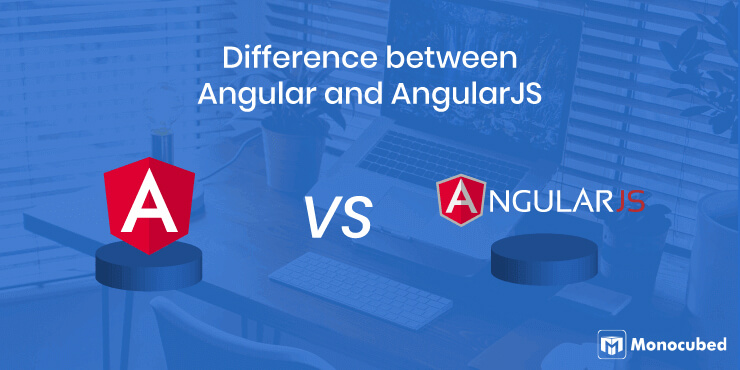In today’s digital landscapes, businesses are always exploring strategies that can aid them to stand apart in this acute competition. Web and mobile applications have become a basic need and useful marketing means for any successful company. To construct user-friendly applications, frameworks are used.
Amongst the best javascript frameworks, Angular and Angular js are the most popular frameworks used for front-end web development. Before answering what is the difference between Angular and AngularJS, let us examine its approaches.
AngularJS is a trending framework nowadays as it has wide scope for structuring exceptional single-page web apps. It is a structural platform that fundamentally expands the HTML DOM with added features and helps in forming a responsive application to the users’ acts.
Whereas, Angular versions are highly preferable as a robust front end-tool supplying components that assist a developer to write and re-write, easy-to-use, readable, and maintainable code.
Let us have a quick look at this article on AngularJS vs Angular and their concepts.
Table of Content
Introduction to Angular Framework
Angular is a framework that is used for developing single-page applications using TypeScript and HTML programming languages. Angular is generally denoted as Angular 2+ or Angular v2 and beyond.
Angular2 follows core and optional functionality as a set of TypeScript libraries and utilizes numerous features of ECMAScript 6 that you may import to your applications. Its architecture depends on certain crucial scope and conceptions.
The basic building blocks in Angular 2 are NgModules, which provide a compilation structure for components and directive. These modules of Angular 2 assemble interrelated codes into a well-designed set.
In this approach, the application comprises a root module that authorizes bootstrapping and characteristically has more feature modules and improvement.
Angular is a very versatile framework. We offer Angular development services that include different web solutions like single page applications, progressive web apps, eCommerce solutions and web portals.
Before understanding Angular vs Angular JS, let us have a look at what Angular versions are.
Versions of Angular
Angular 1 is at the center of the DOM compiler. We can write HTML, and Angular compiler takes charge of assembling it into an application. Angular 2 is based on JavaScript. It is an open source to develop web applications from scratch in JavaScript and HTML.
Angular 4 is a JS framework for developing apps in HTML, JavaScript, and TypeScript, that is a superset of JS.
From the varied versions of Angular, the release of Angular 6 had the prime focus on tool chain, making it function promptly with Angular in ng app update, ng add, Angular Material + CDK Components, Angular CLI (command line interface) workspaces, animation and validations package, RxJS v6, and Angular Elements.
The version of Angular 9 is rationalized to work chiefly with TypeScript 3.6 and 3.7. It has the ability to move all the applications to employ Ivy compiler view engine and runtime by default.
Features of Angular
- Angular develops native web applications with approaches from Ionic, Cordova, or NativeScript.
- It uses contemporary web policy and compatibility to convey app-like capabilities – offline, speed in performance, and zero step installation.
- It has the command line tools that aids in adding tests, components and other related things, then promptly deploys it.
- It creates UI views with powerful and simple template syntax value quickly.
- It creates complex, high-performance animations timeline and documentation with less adoption of code through Angular’s in-built API.
Introduction to AngularJS Framework
AngularJS is an open-source JavaScript framework that is maintained by Google and a community of Angular developers to address challenges faced in forming single page web applications.
In 2009, AngularJS was initially developed by Misko Heavery and had a motive to ease the development and thereby, the testing process of these applications. AngularJS programming renders the highest simplifications and improvements to the complete development approach and constitution of JS coding.
AngularJS renders the program for model view controller (MVC) and model view-view model (MVVM) architecture, besides the components that are usually used in dynamic web technologies.
The latest version of AngularJS is 1.8.x. The framework is in long term support mode since July 2018.
It has gained immense popularity as is the front end portion of MEAN stack, comprising Express.js app server structural programs that link dynamic MongoDB databases, Node.js server runtime environment, and Angular.js itself.
Features of AngularJS
- Controllers are JavaScript functions that are bound to a specific case and scope.
- Data binding is the programmed synchronization of the data between view and model components.
- AngularJS presents several inbuilt services to fulfill the requirements. For example, http to create a XML Http Requests.
- Routing is a notion of transferring the views, and hence, providing solutions.
- Directives are the markers on DOM foundations like attributes, data, elements, CSS, and more. These can be utilized to make customized HTML tags that may serve as new widgets. It has inbuilt directives namely ngBind and ngModel.
- Model View Whatever (MVW) is a pattern for separating data application into dissimilar parts called model, view, and controller, each with distinctive accountabilities. It does not devise MVC architecture in traditional style, but rather is somewhat nearer to model view view model (MVVM). AngularJS team denotes it amusingly as Model View Whatever.
Also Read: Top AngularJS Frameworks To Consider For Your Web Development Project
Vital Difference Between Angular and AngularJS
AngularJS uses the functions by reading the HTML page, which has an added norm HTML attributes rooted into it for building user interfaces.
In contrast, Angular framework makes it easier to develop complex web applications. It utilizes dependency injection, variable, declarative template engine, end to end tooling, and integrated best practices to answer the challenges in development.
The following table depicts the aspects on Angular vs AngularJS in detail:
Key Features |
Angular |
AngularJS |
|---|---|---|
| Architecture | Angular uses components and directives. | Angular.js works on MVC (Model-View-Controller) design. |
| Language | Angular code is written in Microsoft TypeScript. | AngularJS code is written in Javascript. |
| Mobile | Angular builts mobile support applications. | AngularJS code is not mobile-friendly. |
| Expression syntax | ( ) and [ ] attributes are used for two way binding between view and model. | {{ }} expressions are used for two way binding between view and model. Special methods, ng-bind can also be used to do the same. |
| Dependency Injection | A hierarchical dependency injection system is used. | Dependency injection system is not used. |
| Routing | The Angular team uses @RouteConfiguration {(…)} to define routing information. | AngularJS development team uses @routeProvider.when ( ),for configuration and routing information. |
| Management | Angular code has a better structure, and it is easy to create and manage large Angular applications. | AngularJS project is difficult to manage with increasing the size of the source code. |
Creating an Unforgettable User Experience For Your Website?
Attractive UI-UX, interactive elements, unforgettable graphics – get it all for your website or web app. Talk to our Angular expert for free.
Pros and Cons of Angular and Angular JS Framework

From the above Angular JS vs Angular, we can ascertain that the JavaScript Angular JS framework, simplifies the output of application development when compared to RESTful services for an absolute responsive project performance.
On the other hand, different versions of Angular permit everyone to support and enlarge HTML syntax to express the component of the applications in a lucid manner.
Keeping in mind that every technology has its own advantages and disadvantages of using any framework. The same applies to Angular JS and Angular. Below are some of the pros and cons of these two frameworks that will help you choose Angular or AngularJS.
Why Angular?
The following list will let you understand, ‘Why use Angular?’
- The latest version of Angular supports TypeScript that allows code modularity and code optimization using the OOPS concept.
- It has a mobile support framework.
- Angular supports the changes for an enhanced hierarchical dependencies system along with the modularity.
- A developer gets the choice to function with the features like Dart, syntax for type checking, TypeScript, Angular CLI, ES5, iterators, lambda operators, and ES6.
- Angular follows semantic versioning which contains major-minor-patch arrangement.
- One of the major benefits of Angular is that it provides the event of simplest routing.
- When it comes to the event of set-up, Angular2+ versions are more complex than Angular JS.
- It is not an ideal choice if the aim is to create an output of simple web applications.
- Here, in Angular, directing an extensive range of browsers is challenging as it does not support all the traits of modern versions. You can compensate by loading polyfill scripts for browsers that you should support.
Why AngularJS?
The following list will let you understand, ‘Why use Angular JS?’
- AngularJS uses a great MVC (Model-View-Controller) data binding that makes dynamic application performance.
- Here, change detection and unit testing can be done at any point of time.
- The web developers can use the features like declarative template language using HTML to help and support them turn more intuitive.
- This open source framework provides the much-structured front end development process, as it does not need any other platforms or plugins to work.
- The Angular.JS programmers will be able to run AngularJS application on iOS and Android devices, including phones and tablets.
- AngularJS is not only big but also complicated because of its multiple ways of performing the same thing.
- One of the major drawbacks of AngularJS is that it has a scale of implementation which is a little rough and poor.
- On disabling the JavaScript of an AngularJS app, users get to see a page which is basic.
- Further, UI gets cracked up with the rush of more than 250+ apps at one time in Angualr JS.
Frequently Asked Questions
Is Angular better than Angular JS?
An improved algorithm for data binding and a component-based architecture can be availed through Angular. Whereas, in Angular.JS, the two-way binding property gets easier and faster binding without any further involvement of engineers. The elements of any Angular project are much self-sufficient and independent, while AngularJS is for quicker prototyping and coding.
Why use AngularJS?
Angular JS directives and components bring the much-needed added functionality to HTML. They are an attribute of AngularJS framework which can be operated to make custom-built HTML tags that facilitate new and tailored widgets. Because all the controllers rely on dependency injection (DI) to send information, these unit tests are capable of seizing DI to execute unit testing.
What is AngularJS used for?
AngularJS is one of the most popular web frameworks that can be used to develop weather, eCommerce, travel, user-review, video streaming, social, user-generated applications. Some popular Angular app examples are The Guardian, PayPal, Upwork, Freelancer, LinkedIn, Netflix, and Weather.com.
Conclusion
From the article and above comparison table depicting the difference between AngularJS and Angular, we can observe that Angular.JS is a robust framework that is used to develop scalable client-side website applications with lesser development effort and time.
With its valuable concepts and functionalities, it gets the application to run fast and be stable. In fact, Angular version provide several benefits to front end developers, which is the prime reason why various popular companies use Angular for their projects.
We provide Angular development services for building dynamic desktop, mobile, and web applications. Contact us today with your web idea.
 By Jeel Patel
By Jeel Patel



